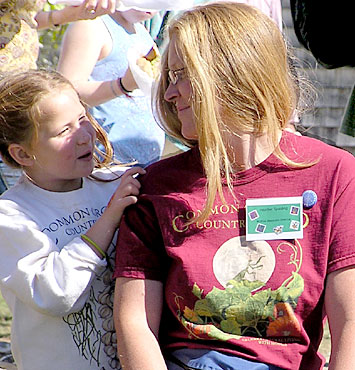 |
| Heather Spalding and Elizabeth Sugg in their organic cotton shirts. |
by Alex Owre
All T-shirts sold at the Common Ground Country Store and supplied to Fair volunteers are made from certified organic cotton grown in Texas. The 810 dozen on hand for this year’s Fair represent approximately eight bales of ginned cotton (cotton with bulbs, seed, sticks and leaves removed), the product of just under 5 acres.
The bales are shipped to a spinning mill in North Carolina where the fibers are separated from any remaining cotton “trash” and are further cleaned, then aligned and formed into yarn. The yarn travels to Pennsylvania to be knit into cloth tubes, to have the fabric finished, and to be cut and sewn.
Finished shirts come to Maine to be screen printed using water-based inks. Water-based, PVC-free ink provides for a healthy workplace and lower impact on the environment. Unlike in conventional print shops, the only solvent necessary is water, which is filtered for reuse.
A hot-weather crop, cotton will not grow in Maine. If American cotton is desired, it must be sourced from the Sunbelt. As well, knitting tubular garments such as T-shirts requires specialized equipment and a particular expertise not found in Maine. According to Liberty Graphics (which sourced and printed the T-shirts), the Lehigh Valley of Pennsylvania is the closest locale where shops have the requisite capabilities to perform this work. Cutting and sewing operations are naturally located near the knitting shops, so local businesses there benefit during the manufacturing process. Despite the shipping distance, the T-shirts are produced with the smallest possible environmental footprint.
Why Organic Cotton?
Under conventional farming practices, cotton production entails substantial chemical inputs. The following statistics are based on USDA reporting on American-grown cotton. Higher chemical inputs, less stringent environmental safety measures and poorer reporting of abuses often characterize cotton production overseas.
Pesticides comprise 3% of inputs to cotton, and are typically some of the most hazardous pesticides on the market, including aldicarb, phorate, methamidophos and endosulfan. According to the Pesticide Action Network North America, pesticides used on cotton are often broad-spectrum organophosphates – substances originally developed as toxic nerve agents during World War II – and carbamate pesticides, also nervous system disrupters.
At a rate of 4.4 pounds of pesticides applied per acre of conventionally grown cotton, the land needed to produce the Common Ground T-shirts would absorb approximately 21 pounds of these dangerous chemicals.
Synthetic fertilizers make up 97% of the inputs to cotton, with application of roughly 144 pounds per acre. The cotton for Common Ground T-shirts, if grown conventionally, would have required 677 pounds of synthetic fertilizer. Cotton is a heavy feeder, and applying excess nitrogen fertilizer is not uncommon in conventional crops in the United States.
Plants fertilized organically require less fertilizer than plants fertilized synthetically. Synthetic fertilizers used on conventional cotton do not improve soil structure, stimulate soil life, or improve the soil’s long-term fertility, as do organic methods of improving soil fertility. Because many ingredients in synthetic fertilizers are highly water soluble, they can leach through or run off soils, polluting surface and ground waters and contributing to eutrophication.
The proportion of U.S. cotton farmers who chose to plant genetically engineered (GE) varieties – primarily for herbicide and insect resistance – rose from 83% in 2006 to 87% last year. The environmental risks of GE cotton can include development of insect resistance, toxicity to non-target insects and soil microorganisms, and the need for increased pesticide applications. In addition, contamination of non-GE cotton by GE varieties has been reported around the world.
While most consumers consider cotton to be a fiber crop primarily, components of the plant enter the food chain via its seed, which is processed into cottonseed oil for fried snacks, peanut butter and many other foodstuffs. Cottonseed meal is used for animal feed.
A Choice We Wear
T-shirts manufactured in the developing world come cheaper, via established commercial brands, than those made here. These less-expensive garments have a hidden cost, however: According to researchers at Behind the Label, fully 80% of apparel workers producing for the American market toil under conditions that violate both local law and international labor standards.
By purchasing organic cotton products from the United States and from Fair Trade-certified suppliers abroad – who are guaranteed a fair price for their goods, and whose production process meets stringent, internationally established labor standards – consumers help small farmers instead of giant agribusinesses and take a stand on fair and safe labor practices. They will also help increase the organic share of the roughly 3% of global farmland that is planted with cotton.
